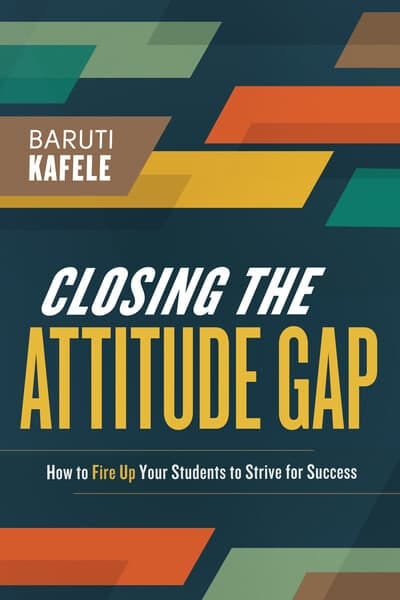Review of “Closing the Attitude Gap: How to Fire Up Your Students to Strive for Success,” by Baruti K. Kafele, 2013. Alexandria, VA: ASCD. Paper, 144 pages.
I disagree strongly with how Mr. Kafele says we should handle poverty.
Mr. Baruti Kafele has become a much sought-after speaker for professional development and other education-related programs nationwide. In addition to this book, he wrote the best seller “Motivating Black Males to Achieve in School and in Life” (Association for Supervision and Curriculum Development [ASCD], 2009). This current book focuses on helping students to improve their attitudes, set goals, and work harder. It tells the story of the original school where he turned test scores completely around and overnight got students on the right track.
Mr. Kafele has many great ideas for helping students, starting with making sure the teachers are in the right frame of mind to accept students for who they are and then help them achieve great things despite the disadvantaged situation they may be in. He includes interesting self-reflection questions for the teachers to consider about their students, such as:
· Do I believe in them?
· Do I treat teaching them as a mission?
· Do I set incremental and long-term goals for them to achieve? (p. 30)
Mr. Kafele puts forth a lot of opinions on the importance of students using clean paper to submit assignments, the essential component of hard work, the hope that teachers will come to know how their students really are. In short, he emphasizes clarity, respect, and drive in the classroom. (I will not give all of the content away regarding what we as teachers should encourage students to do and say in the classroom.)
While he includes a lot of do-able interesting approaches to teaching, he also makes some statements I do not care for.
I disagree strongly with how Mr. Kafele looks at what to do about students living in poverty…
I feel his mindset is a negative and hopeless one regarding poor students and how to help them. For example, he states:
“As a classroom teacher, you have no control over poverty; you cannot change the conditions that your students might be going home to every day. At best, you can inspire your students to one day rise above their situation, but you cannot change it, so it makes little sense to dwell on it or make it an excuse…” (p. 25)
I feel it is ironic he makes these statements, when his main goal is to improve attitudes. Perhaps he has not felt enough disappointment or loss, or at least he has never been hungry enough to understand what it is like to be starving when you are supposed to be doing your homework and concentrating on it carefully. I was very surprised he has these kinds of opinions.
He revisits these feelings that it is not the job of educators to fix poverty or to do anything other than just insure the classroom is a positive place and one in which they can excel (p. 93). Instead of giving us any idea what to do about poverty, Mr. Kafele includes a paragraph next on how important it is that the classroom be a neat, orderly, organized area in which to inspire students to learn.
Despite the strange perspective on poverty and what to do about it—or rather the notion that nothing can be done about it—Mr. Kafele has written a very good book here with great ideas for helping students do better. I think I will go ahead and recommend the book—with the caveat that the comments on poverty seem foolish and rather unhelpful.
As a stand-alone book, I do not think this text leaves the right impression—
or a complete one—about disadvantaged students and how to better understand and teach them.
There are many books that could be used along with this one in professional development sessions or teacher education courses.
One such book is “America’s Poor and the Great Recession,” by Kristin S. Seefeldt & John D. Graham, with a foreword by Tavis Smiley, University of Indiana Press, 2013.
Another is “The Rich and the Rest of Us” (by Tavis Smiley and Cornel West, SmileyBooks, 2012). Both are brief paperbacks chock full of facts and information so essential to understanding the poor conditions in which many of our students are currently living.
Ignoring the recession and poverty do not seem very informed ways to proceed as citizens or as educators. There are many things teachers can do in their classroom, help students by providing information about resources, help families get connected to the assistance they need, provide referrals to others with more technical information, and of course read up on, study, and discuss poverty.
Ignoring the challenges of poverty and loss and disappointment does not seem to me to be the most responsible way of helping others.






